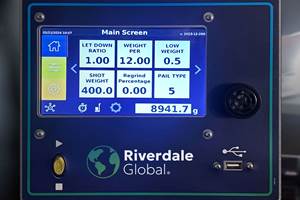Colloidal Silica Cuts Cycle Times in Molding Engineering Plastics
A year ago, we reported research showing that very small amounts of ultra-fine silica can reduce injection molding cycle times 20% to 30% in PP, nylons, PBT, and ABS (see Learn More). These results have since been confirmed in numerous commercial applications, according to Dr.
A year ago, we reported research showing that very small amounts of ultra-fine silica can reduce injection molding cycle times 20% to 30% in PP, nylons, PBT, and ABS (see Learn More). These results have since been confirmed in numerous commercial applications, according to Dr. Pravin L. Shah, head of Rheo-Plast Associates, a technical consulting firm that has been working on application development and laboratory testing of Nan-O-Sil ASD colloidal synthetic silica for its manufacturer, Energy Strategy Associates. According to Dr. Shah, the cycle-time reductions have been demonstrated in 16- and 32-cavity molds, along with other benefits such as reduced flow lines and improved dimensional stability. In addition, Nan-O-Sil ASD reportedly can improve color dispersion, allowing some molders to reduce colorant levels and thereby pay for the silica.
New laboratory test results from Rheo-Plast indicate that the benefits previously demonstrated also extend to other engineering resins such as acetal, glass-filled polycarbonate, PPS, and PEEK. Also new is the ability of Energy Strategy Associates to supply Nan-O-Sil ASD in compounded pellet concentrates with a wax or a desired resin as the carrier. Up to now, the colloidal silica has been supplied as a white powder with spherical particles of 0.02 to 0.55 microns (20 to 550 nanometers).
As shown in the accompanying table, addition of just 0.8% silica shortened injection molding cycle times for tensile test bars by 22% to 31% for unfilled acetal copolymer, PPS, and PEEK, as well as 33% glass-filled PC. Mechanical properties were generally maintained or improved. Although the data are not shown, Rheo-Plast also found that Nan-O-Sil ASD reduced cycle times by 5% with Noryl PS/PPO blend and 27% with HDPE. Dr. Shah also notes that the silica eliminated sticking problems that commonly occur with PPS.
It is believed that colloidal silica reduces cycle time by speeding cooling, even though the amount of additive is very small. The companies are working with the School of Polymer Processing and Materials Science at Penn State University in Erie, Pa., to study thermal effects inside the mold and arrive at a better understanding of how colloidal silica works to shorten molding cycles.
Dr. Shah says the cost savings possible from faster cycles outweigh the additive cost, which is less than 3¢ per pound of resin at the 0.8% addition level. That works out to less than $3/lb for the pure colloidal silica.
In addition to the new pellet concentrates, there are different ways to add Nan-O-Sil ASD in pure powder form at the processing machine. One is to tumble blend the additive with resin for 15 min before molding. According to Dr. Shah, there is no dusting because the silica tends to stick to the pellets. He adds that there is no safety hazard in handling Nan-O-Sil ASD powder.
Another method is to use a feeder at the machine throat to meter the silica in proportion to the resin. In addition, users of liquid colors or additives can mix the silica with the liquid prior to molding.
Effect of Nanosil ASD on Properties of Engineering Plastics | |||||||
| Material | Cycle-Time Reduction, % | Tens. Str., kpsi | Elong. @ Yield, % | Flex. Mod., psi | Notched Izod Impact, ft-lb.in. | HDT @ 66 psi, F | MFI, g/10 min |
| Acetal | |||||||
| 8500 | 6 | 360,000 | 1.2 | 310 | 9 | |
| 23 | 9400 | 6.5 | 380,000 | 1.2 | 310 | 9 |
| PC + 33% Glass | |||||||
| 18,300 | 3.3 | 1,020,000 | 2 | 305 | 7 | |
| 29 | 19,000 | 3 | 1,020,000 | 2 | 305 | 7 |
| PPS | |||||||
| 12,500 | 1 | 610,000 | 0.5 | 400 | 10 | |
| 31 | 13,400 | 1 | 650,000 | 0.5 | 400 | 10 |
| PEEK | |||||||
| 14,500 | 5.1 | 600,000 | 1.6 | 320 | 17 | |
| 22 | 15,500 | 6 | 700,000 | 1.6 | 320 | 17 |
Related Content
Non-PFAS Mold Release for High-Temperature Polymers
Avient’s Evoluscend is designed to boost manufacturing efficiency.
Read MoreSI Group Gets FDA Approval Extension for Weston 705 & 705T
SI’s phosphite antioxidants get ‘green light’ for use in PET food-contact packaging
Read MoreRiverdale Global Showing Latest Innovations and New Satellite Location in Wisconsin
NPE2024: Live demos of updated RGS controller are among the highlights at its Wisconsin facility that will house the ‘new’ color R&D lab.
Read MoreICIS Launches: Ask ICIS Generative AI Commodities Assistant
Said to be the first of its kind, this AI assistant will enhance access to ICIS’ intelligence and insights for the energy and chemical markets.
Read MoreRead Next
Beyond Prototypes: 8 Ways the Plastics Industry Is Using 3D Printing
Plastics processors are finding applications for 3D printing around the plant and across the supply chain. Here are 8 examples to look for at NPE2024.
Read MoreSee Recyclers Close the Loop on Trade Show Production Scrap at NPE2024
A collaboration between show organizer PLASTICS, recycler CPR and size reduction experts WEIMA and Conair recovered and recycled all production scrap at NPE2024.
Read More










